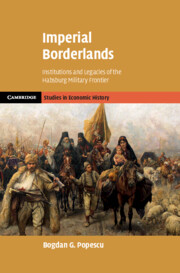Book contents
- Imperial Borderlands
- Cambridge Studies in Economic History - Second Series
- Imperial Borderlands
- Copyright page
- Contents
- Figures
- Tables
- Acknowledgments
- 1 Historical States, Imperialism, and Development
- 2 Imperialism and Extractive Institutions: A Theoretical Framework
- 3 The Habsburg Military Frontier
- 4 Military Colonialism and Economic Development
- 5 Colonial Institutions and Social Norms
- 6 Lasting Legacies Political Attitudes and Social Capital
- 7 Beyond the Habsburgs
- Epilogue
- Book part
- Primary Sources
- Index
2 - Imperialism and Extractive Institutions: A Theoretical Framework
Published online by Cambridge University Press: 09 November 2023
- Imperial Borderlands
- Cambridge Studies in Economic History - Second Series
- Imperial Borderlands
- Copyright page
- Contents
- Figures
- Tables
- Acknowledgments
- 1 Historical States, Imperialism, and Development
- 2 Imperialism and Extractive Institutions: A Theoretical Framework
- 3 The Habsburg Military Frontier
- 4 Military Colonialism and Economic Development
- 5 Colonial Institutions and Social Norms
- 6 Lasting Legacies Political Attitudes and Social Capital
- 7 Beyond the Habsburgs
- Epilogue
- Book part
- Primary Sources
- Index
Summary
Building on the introduction, Chapter 2 goes back to the more general notion of extractive institutions and proposes a theoretical framework that helps explain a conundrum in the literature according to which extractive institutions are sometimes beneficial and sometimes detrimental for economic development. I contend that the persistent effect of extractive colonial institutions depended on the extent of imperial infrastructural investment, the treatment of property rights, and the use of violence. The worst scenarios for long-run development demonstrate little public investment, the removal or weakening of individual property rights, and high levels of coercion through violence. In the second part of this chapter, I discuss the role of elites in the creation and perpetuation of such institutions. I argue that colonial subjects who had been deprived of public goods (because of underinvestment from the center), had not enjoyed individual property rights for centuries, and had been exposed to imperial violence, were likely to become alienated from the state. Such alienation persists over generations, outliving the formal institutions that created it.
- Type
- Chapter
- Information
- Imperial BorderlandsInstitutions and Legacies of the Habsburg Military Frontier, pp. 27 - 65Publisher: Cambridge University PressPrint publication year: 2023

